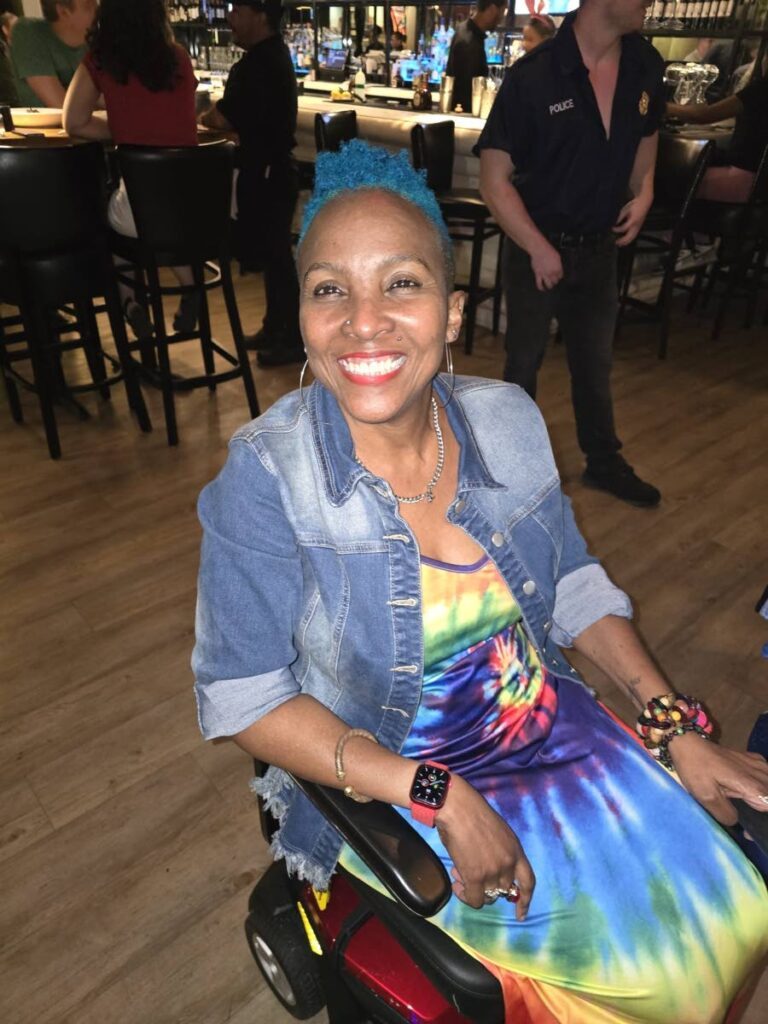From rock-climbing to cycling – yes, I can

Stacey Samuel-O'Brien
I am a physically disabled TT national living in the US who uses a mobility scooter when I’m out. In the US, I feel comfortable venturing out on my own because I am confident that, in most instances, I will be able to function with ease. Unfortunately when I come home, I’m not as confident because, with the exception of the airport, disabled people seem to be an overlooked subset of the population.
People with disabilities can lead fulfilling, independent lives, but sometimes, we require certain accommodations and support from the public. As a society, we need to appreciate that our disabled population should not be written off just because they might function differently.
Starting at the top, legislation goes a long way to ensuring inclusivity. Laws that mandate certain protections for the disabled in public and/or in the workplace, for example, standardised building accessibility, can drive necessary change in TT. Laws that protect the disabled, can also benefit members of other vulnerable populations, like the elderly and children.
I appreciate that some changes have been made with respect to the physically disabled (for example, adding kerb cuts to some pavements) but there is so much more that can, and should, be done. Understandably, neither the enactment of legislation, nor changes to the infrastructure, will happen overnight, so, in the meantime, there are small but impactful changes that can be made by businesses and the public at large.
Businesses can provide sensitivity training and empower their employees to use good judgment when faced with situations that may fall outside the norm.
Empathy and compassion are two major qualities that can ensure positive interactions with the disabled, but knowledge and information are also critical. Employers, social groups and advocacy organisations should actively communicate recommendations and best practices so that the general public understands how to interact with disabled people they encounter.
At the ground level, most of my experiences with the public have shown me that, as a society, we have made great strides in the treatment of the disabled.
But I’ve been lucky. Not everyone can say that their interactions are supportive or sensitive.
It is important to understand that, if you want to help a disabled person, you are not expected to know exactly what to do or how to help. First and foremost, you need to ask the person if they would like to be helped and then listen to their response about how to help.
It’s equally important to avoid making assumptions about the help they need. And always treat disabled people with dignity and respect, just as you would want to be treated.
I share my stories as a person living with multiple sclerosis (MS) in the hopes of inspiring other disabled people and others dealing with adversity, to show that while everyone’s experience is different, what is important is finding ways to continue doing the things that bring joy in life, even if in a different way. It is certainly okay, and inevitable, to have bad days, but I think the key is to not let the bad days become all-consuming, and to find positive ways to cope. Doing so contributes immensely to being able to thrive in the situations in which we find ourselves.
Six years ago, on a whim, I called a rock-climbing gym in my neighbourhood to ask if they offered anything suitable for the disabled.
Surprisingly, I was referred to Catalyst Sports. Catalyst is a non-profit sports organisation with multiple chapters in the southeast US, which is wholly geared to providing adaptive sports programmes to those who are physically disabled. The group meets at the gym every Wednesday night and as a result, I’ve become an avid, adaptive rock climber. I also cycle with them on occasion.
The interesting thing about my rock-climbing is that I wanted to try many years ago, before my disability, but never explored it. Now I climb weekly, and meeting up with the other climbers and volunteers who help us is one of the most fulfilling and rewarding activities in which I participate. These days, my disability spurs me in so many different ways.
When dealing with adversity or a disability, life certainly changes, but it need not stop. I’m lucky; I have found ways to keep doing most things that bring me joy (I travel with ease, I come home for, and enjoy, Carnival) in spite of the fact that MS and my physical limitations have slowed me down considerably.
It would be great if my counterparts in TT could definitively say the same. I’d love to see a TT that takes care of and embraces all of its citizens. A TT where all can thrive, flourish and be contributing members of society, regardless of their abilities.
Multiple sclerosis (MS) is a debilitating autoimmune disease that affects the central nervous system.
In MS, the body’s white blood cells attack the protective covering of nerve fibres. When nerve fibres become exposed, electrical messages between different parts of the body and the brain are no longer transmitted effectively. MS can lead to sensory, cognitive, digestive and muscular issues.
It is a degenerative disease for which there is no cure.
Editor's note: This is the final installment in a limited series of columns which explored the challenges of disabled people and facilities in place to help.

Comments
"From rock-climbing to cycling – yes, I can"